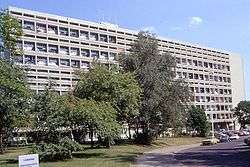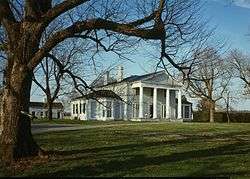Westend may refer to:
- Westend (Berlin), a locality of Berlin in Germany.
- Westend (Frankfurt am Main), a borough of Frankfurt am Main in Germany.
- Wiesbaden-Westend, a borough of Wiesbaden in Germany.
- Westend, Espoo, a borough of Espoo in Finland.
- Westend, Oxfordshire
- Westend, South Gloucestershire
- Westend Football Club, FA Charter Standard Development Club in Huddersfield, West Yorkshire
See also [link]
- West End (disambiguation)
- Westende, a town in Belgium
| This disambiguation page lists articles about distinct geographical locations with the same name. If an internal link led you here, you may wish to change the link to point directly to the intended article. |
https://wn.com/Westend

Westend (Berlin)
Westend is a locality of the Berlin borough Charlottenburg-Wilmersdorf. It emerged in the course of Berlin's 2001 administrative reform on the grounds of the former Charlottenburg borough.
Geography
Westend is situated west of Berlin's inner city on Spandauer Berg, the northern peak of the Teltow plateau between the river valleys of Spree and Havel. Originally a mansion colony, it is today a quite densely settled, still affluent territory adjacent to Charlottenburg in the east. It is centered on Theodor-Heuss-Platz, a large square, from where the Heerstraße arterial road runs westwards to the Berlin city limits. In the west and north, Westend borders on the Berlin Spandau borough.
The locality also includes the neighbourhoods of Neu-Westend and Ruhleben, a suburban housing area of the 1920s. The site of the former Ruhleben internment camp, a World War I detention camp for civilians, today is part of the adjacent Spandau district. Furthermore, the areas of Pichelsberg, Heerstraße and Eichkamp at the northern rim of the Grunewald forest belong to Westend. It is home of the Berlin trade fair (where the Internationale Funkausstellung is held) and of the former Reichssportfeld area of the 1936 Summer Olympics.

Westend (Trevilians, Virginia)
Westend is a temple-fronted house near Trevilians, Virginia. Built in 1849, the house's design refers to the Classical Revival style, representing an extension of the Jeffersonian ideal of classical architecture. The house was built for Mrs. Susan Dabney Morris Watson on a property that she had inherited from her late husband. The building project was supervised by Colonel James Magruder. The house was the centerpiece of a substantial plantation, and a number of dependencies, including slave dwellings, survive. Westend remains in the ownership of the descendants of Mrs. Watson.
The two-story house is built of brick, and features a tetrastyle Tuscan portico on its principal facade. The main three-bay section is flanked by three-bay, one-story wings and surmounted by a hipped roof with prominent interior chimneys The fronts of these wings were originally orangeries. The rear facade features a one-story Tuscan porch. The house is painted in a light color to resemble stucco. The interior is arranged around a central hall that is subdivided into an entrance hall and a stair hall to the rear, with two rooms to either side.
Kan
Kan or KAN may refer to:
Places
People
Music

Škan
Škan is an American Extreme Metal band formed 2013.
Biography
Škan was founded November 11 of 2011 in Austin, Texas, as a solo recording artist. The live band was formed November 2 of 2013.
Transcending the rigid boundaries of established metal genres, their music creates an esoteric atmosphere that lays bare the nature of death and illumination in all its destructive glory. Škan's aggressive and haunting forces embrace the blackest of eternal flames and seek to unchain the very bonds of existence.
Škan released their first EP "The Old King" in November 11, 2013 which quickly gained them a loyal following and praise from many supporters across the world who appreciated their uncompromising sound and vision. Featuring in many online press reviews the EP was well received with standout tracks like “The Eye" leading to them being nominated by Metal Underground as "Best Newcomer " for 2013. In the months that followed they unleashed their ritualistic live shows alongside international acts like Voivod, Danzig, and Portal, and 2014 saw them performing an intense main stage show at Phil Anselmo's Housecore Horror Film Festival.

Kansas
Kansas ![]() i/ˈkænzəs/ is a U.S. state located in the Midwestern United States. It is named after the Kansa Native American tribe, which inhabited the area. The tribe's name (natively kką:ze) is often said to mean "people of the wind" or "people of the south wind", although this was probably not the term's original meaning. Residents of Kansas are called "Kansans". For thousands of years, what is now Kansas was home to numerous and diverse Native American tribes. Tribes in the eastern part of the state generally lived in villages along the river valleys. Tribes in the western part of the state were semi-nomadic and hunted large herds of bison. Kansas was first settled by European Americans in the 1830s, but the pace of settlement accelerated in the 1850s, in the midst of political wars over the slavery issue.
i/ˈkænzəs/ is a U.S. state located in the Midwestern United States. It is named after the Kansa Native American tribe, which inhabited the area. The tribe's name (natively kką:ze) is often said to mean "people of the wind" or "people of the south wind", although this was probably not the term's original meaning. Residents of Kansas are called "Kansans". For thousands of years, what is now Kansas was home to numerous and diverse Native American tribes. Tribes in the eastern part of the state generally lived in villages along the river valleys. Tribes in the western part of the state were semi-nomadic and hunted large herds of bison. Kansas was first settled by European Americans in the 1830s, but the pace of settlement accelerated in the 1850s, in the midst of political wars over the slavery issue.
When it was officially opened to settlement by the U.S. government in 1854, abolitionist Free-Staters from New England and pro-slavery settlers from neighboring Missouri rushed to the territory to determine whether Kansas would become a free state or a slave state. Thus, the area was a hotbed of violence and chaos in its early days as these forces collided, and was known as Bleeding Kansas. The abolitionists eventually prevailed, and on January 29, 1861, Kansas entered the Union as a free state. After the Civil War, the population of Kansas grew rapidly when waves of immigrants turned the prairie into farmland. Today, Kansas is one of the most productive agricultural states, producing high yields of wheat, corn, sorghum, and soybeans. Kansas is the 15th most extensive and the 34th most populous of the 50 United States.

